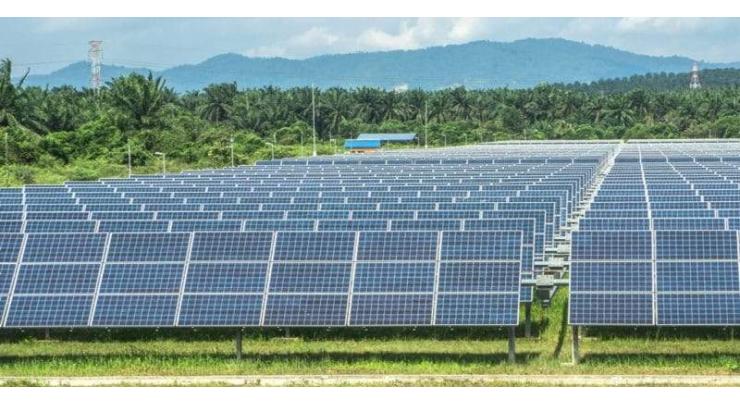
Agreement Signed For 300KW Solar Power-Plant At CUI
Muhammad Irfan Published October 23, 2020 | 09:19 PM

COMSATS University Islamabad (CUI) has signed an agreement with a private company to setup a 300KW Solar power plant at its Sahiwal Campus
ISLAMABAD, (UrduPoint / Pakistan Point News - 23rd Oct, 2020 ) :COMSATS University Islamabad (CUI) has signed an agreement with a private company to setup a 300KW Solar power plant at its Sahiwal Campus.
The agreement was signed between the CUI and DCH Solar Giga Pvt. at its Islamabad Campus.
The Solar power plant which will take 26 weeks to commission, will generate around 8.8 million units of electricity during the course of the project.
The project will save around 5266 tons equivalent of carbon dioxide emissions, which would have been generated ordinarily, for producing the same amount of electricity through fossil fuels.
Regarding the carbon footprint, it was also informed that the impact of the power plant is equivalent to planting 11,000 full grown trees.
The agreement for establishing the solar power plant came as a result of negotiations of the CUI Directorate of Planning, Development and Human Resource Development, and DCH Solar Giga Pvt. Ltd. on the public private partnership model.
The plant is optimally expected to supply 430,000 units of electricity annually at an average price of Rs. 11.08 per unit to CUI.
The cost that will be recovered for the initial 10-year period will be through sale of electricity priced at Rs. 16 per unit of electricity used, which is expected to drop to Rs. 6 per unit in the last 10 years of the concession period. CUI is currently purchasing electricity from MEPCO at a price of Rs. 25.79 Rs per unit.
According to the agreement, DCH Solar Giga Pvt. will secure financing and set-up the powerplant at the Sahiwal Campus and recover the capital cost over a period of 20 years by supplying low-cost electricity to the Sahiwal Campus.
The project is part of the green initiatives undertaken in line with the vision of Prime Minister Imran Khan, whereby clean, renewable energy will be produced on the various campuses of COMSATS University Islamabad.
Dr. Tahir Naeem, Director, Planning and Development and Human Resource Department CUI, informed the meeting that the project is a shining example for the public sector for deploying affordable, clean, renewable energy generation at zero cost to the public exchequer.
He said that the project envisaged shifting of around 30 percent load of electricity at the Sahiwal Campus initially onto solar power, which will yield commercial benefit to both parties.
He said that CUI will similarly attract private enterprises to undertake joint projects in renewable energy on similar lines at other campuses, which is also an expression of CUI's commitment towards attaining Sustainable Development Goals.
Prof. Dr. Muhammad T. Afzal, Rector CUI while speaking at the occasion informed the meeting that renewable energy is a subject of intensive research around the world.
He said while solar technology will have remarkably advanced during the course of the project, it is hoped that the grid will also be upgraded from time to time adding additional capacity in due course.
Prof. Afzal said that diffusion of renewable energy for high-tech applications in furnaces and industry is the need of the hour.
Pakistan has been naturally endowed with ample sunlight around the year which needs to be adequately harnessed at the commercial and household levels, he added.
The agreement was signed by Prof. Dr. Saleem Farooq Shaukat, Campus Director, CUI Sahiwal and Azeem Arif, Assistant General Manager, DCH Solar Giga Pvt. Ltd. Senior Officials of COMSATS University Islamabad also witnessed the ceremony.
Participants were informed during the signing ceremony that the private party will also ensure the free of cost repair and maintenance of the power grid while upgrading it subsequently.
It was also conveyed that the energy produced during off-days on campus will be supplied to the main grid and benefit CUI at the rate of Rs. 10 per unit, along with savings through reverse metering and add to the national grid capacity.
Related Topics
Recent Stories

Pakistan calls for enhanced information integrity on digital platforms

Pakistan starts discussion with IMF about new loan agreement: Finance Minister

Currency Rate In Pakistan - Dollar, Euro, Pound, Riyal Rates On 16 April 2024

Today Gold Rate in Pakistan 16 April 2024

Govt hikes petrol price by Rs4.53 per litre for next fortnight

British Investment Group, One Homes, Expected to launch second development at Ce ..

Pakistan Army continues rescue operations in rain-affected areas

"China Ready to Strengthen Counter-Terrorism Cooperation with Pakistan: Envoy"

Why multi-millionaires should live in the cheap countries?

IMF recommends Pakistan to tax non-essential items including cigarettes

High-level Saudi delegation arrives in Islamabad

Naqvi suspects India’s involvement in Amir Tamba’s murder
More Stories From Pakistan
-
Death anniversary of Professor Pareshan Khattak observed
18 minutes ago -
Two killed in collision of bikes
28 minutes ago -
Death anniversary of comedian Babbu Baral observed
28 minutes ago -
Saudi delegation's visit heralds dawn of new era in bilateral ties, end to Pakistan's isolation
2 hours ago -
Roti price violation detected at 92 hotels, fine Rs 172,000 imposed on violators
2 hours ago -
Police bust motorcycle theft gang; arrest 2 suspects
12 hours ago
-
NHA working with relevant departments to reopen road closed due to heavy rains, landslides
12 hours ago -
World vaccination week to be observed in Tharparkar from April 24
13 hours ago -
Shifting of offices to new South Punjab secretariat
13 hours ago -
Minor boy killed in wall collapse incident
13 hours ago -
New laurels for PU in QS subject ranking
13 hours ago -
Man’s body found from well
13 hours ago